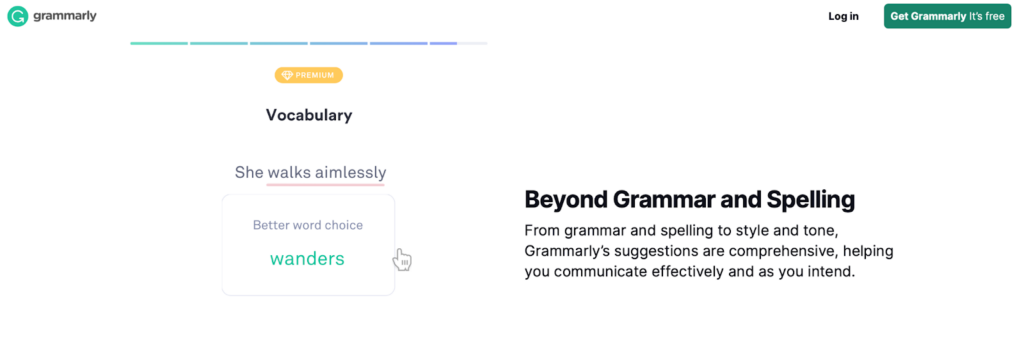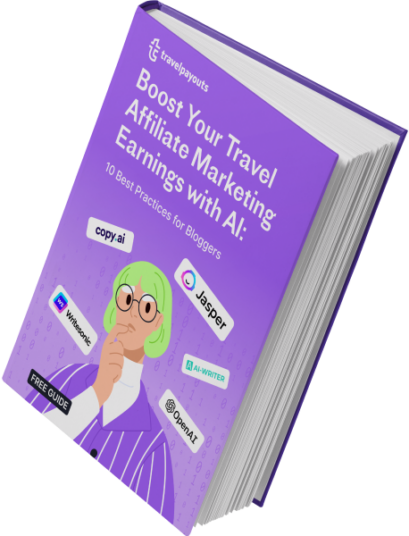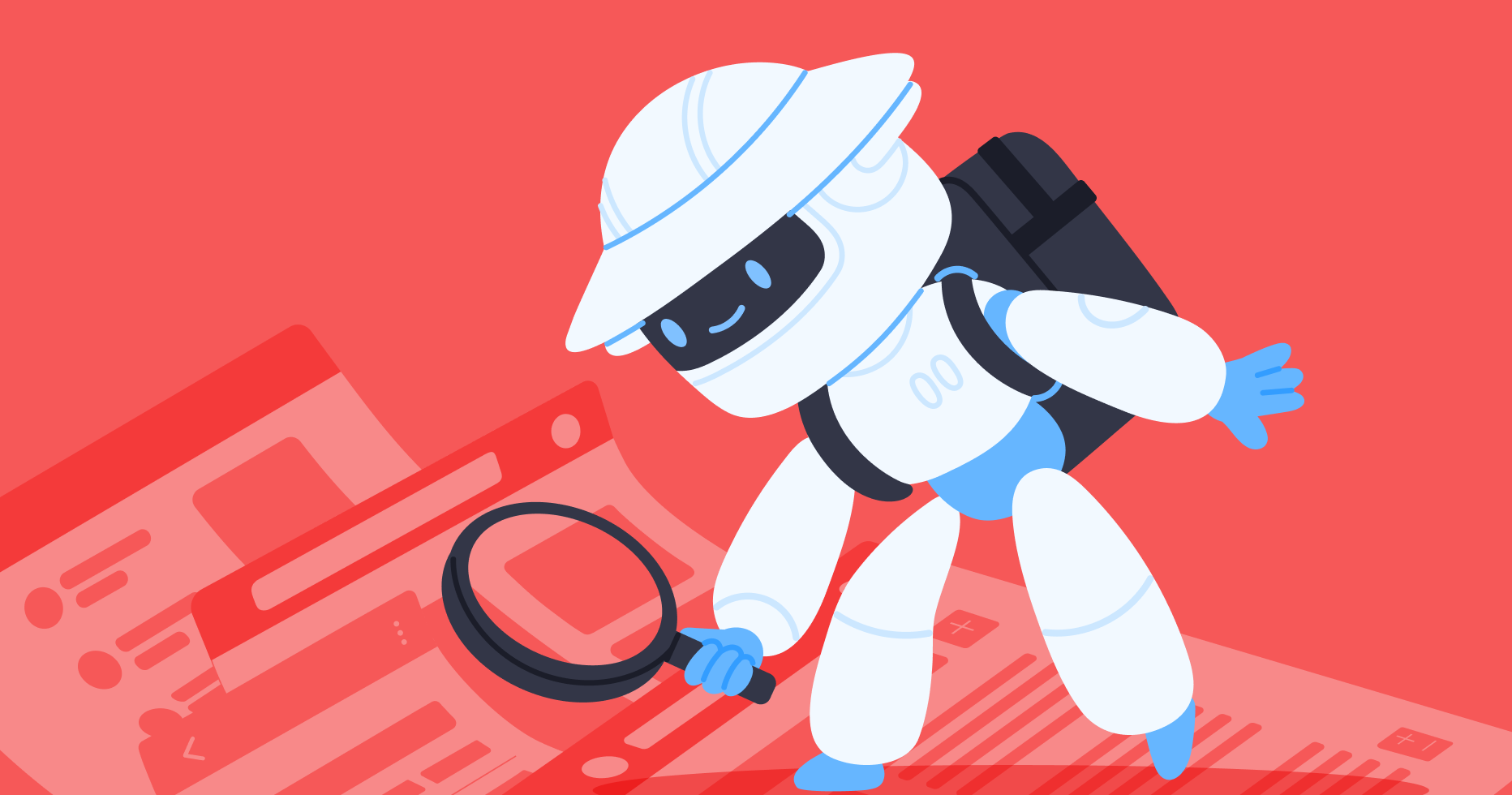As a travel blogger, you may wonder how to leverage AI capabilities to increase productivity, analyze data, and generate insights about consumer behavior. It’s a fascinating technology with the potential to revolutionize how travel businesses market their products and services.
In this article, we’ll discuss what AI marketing is, how marketers use AI, how travel bloggers can leverage the technology, the types of solutions AI marketing offers, and whether or not marketers should be using AI for their marketing campaigns. By the end, you will thoroughly understand what AI marketing means for your travel business.
What is AI Marketing?
AI marketing is the application of artificial intelligence (AI) to the marketing process using algorithms to automate content generation, analyze data, and optimize marketing campaigns. Using machine learning technology, the AI identifies patterns within data sets to create more targeted and personalized content to gain deeper insights into their target audience. Essentially, AI technology helps save marketers valuable time and money by automating repetitive tasks.
Essential Terms in AI Marketing
The rest of this article will use many jargon words associated with Artificial intelligence. Before we continue, here are some terms to better understand every aspect of AI:
- Algorithm – an algorithm is a set of step-by-step instructions for solving a problem or completing a task. AI uses algorithms to create automated processes and intelligent decisions.
- Chatbot – an artificial intelligence-powered computer program that simulates human conversation, usually over the internet.
- Deep Learning – AI detects patterns in data to make predictions without programming instructions (also known as “training”).
- Natural Language Processing (NLP) – NLP is a field of computer science that understands human language. These systems continuously learn conversational tones as human languages evolve.
- Data Mining and Big Data – AI uses data mining to make predictions by identifying correlations in large datasets.
- Machine Learning – enables computers to learn from data and improve their ability to perform specific tasks without explicitly being programmed.
- Return on Investment (ROI) – AI can improve ROI by automating processes, increasing efficiency, and optimizing resources to reduce costs and maximize returns.
- Image Recognition – identifies objects and patterns in digital images or videos to help automate tasks and make informed decisions.
- Speech Recognition – calling customer service might utilize speech recognition to process your spoken words and generate an appropriate response.
How Do Marketers Use AI?
AI is becoming increasingly important for marketers as it can help automate tasks and better understand customers. Digital marketing companies are already utilizing the technology to benefit in the following ways:
- Better understanding of their target audience – enabling them to create more tailored content and personalized experiences.
- Generating content faster and more accurately – through extensive data scanning and natural language processing (NLP), AI technology generates entire blog posts, social media descriptions, video captions, and article outlines and titles.
- Analyzing customer behavior – allowing marketers to quickly identify trends and insights within their data sets.
- Automation of mundane tasks – AI can automate repetitive tasks such as responding to customer inquiries, emails, and comments or scheduling posts for social media.
- Optimizing ad placement in real–time – AI technologies can quickly analyze the effectiveness of different ad placements and adjust accordingly.
- Use of Speech Recognition – Speech recognition technology helps automated customer service interactions and virtual assistants.
- Increased Campaign ROI – AI-driven marketing can help marketers increase campaign ROI by providing personalized customer experiences and leveraging data to deliver more effective campaigns.
Real–World Examples of Artificial Intelligence in Marketing
Artificial Intelligence (AI) may seem like a new or fabled concept. Yet, it’s been implemented in various technologies for quite some time in many familiar products, companies, and services.
A few quick notable examples:
Customer Service Agents – Walmart

Chatbots provide automated answers to complex questions using Natural Language Processing technology. Large companies like Walmart use these features as the initial point of contact for any help inquiries on their website. Once the customer has input information, the AI-driven chatbot provides the most viable solutions for any question.
Personalized Experiences – Spotify

AI marketing tools that assess user interests to create customized experiences based on consumer behavior. For example, Spotify uses AI technology to aggregate data for recommended playlists based on your preferences, popular searches, and present-day trends. The result? Tailor-made playlists of artists they know you love + new music they think you might enjoy.
Digital Assistants – Google Assistant

Apple’s Siri, Amazon’s Alexa, Microsoft’s Cortana, and Google’s Assistant (pictured above) are all examples of Artificial Intelligence that you likely use on your phone or home already. These systems rely on AI technology to process large data sets in response to the user’s input. This often includes questions or automated processes.
Ad Placements – Google Ads

AI technology allows marketing teams to shift ads in real-time based on market trends. Google Ads utilizes this technology better than any other company to maximize ROI in digital marketing campaigns.
Content Generation – Jasper

Many marketing teams already use AI technology to generate content for social media, blogs, advertisements, and other marketing schemes. Popular programs for content generation include ChatGPT and Jasper AI. Although most marketers don’t rely on these programs entirely, they are helpful tools to help brainstorm ideas, hurdle writer’s block, and create blog outlines.
Personalized Recommendations – Amazon

Amazon.com uses AI technology to analyze customer data and tailor product recommendations based on past purchases and browsing history. It also uses machine learning algorithms to sort through available products and suggest items that may interest individual customers.
Facial Recognition – Facebook

Large social media brands like Pinterest and Facebook implemented AI technology years ago to help identify people in photos. The technology has proven strikingly accurate, with an estimated success rate of 99.75%. This data allows the detection of friends in images for user-friendly tagging or personalized recommendations in news, products, or other content.
How Can Travel Bloggers Use AI?
AI’s implications for general marketing campaigns are vast. Yet, as a travel blogger, you can start narrowing down the tools for more personalized use. You might not require everything AI technology offers, but will find many features wildly helpful to save time and money while maximizing audience reach and engagement.
Here are a few ways travel bloggers use AI to help their marketing campaigns:
Brainstorm Ideas

AI can jumpstart your idea generation process through natural language processing (NLP) and predictive analytics. By detecting patterns in online content, AI technology will present potential blog topics, titles, and outlines.
Automating Repetitive Tasks
You can use AI technology to automate repetitive tasks, aiming your focus on more creative endeavors and further building your brand. Automation tools used by travel bloggers typically include tools like chatbots, scheduling posts, researching topics, producing subject email lines, and even FAQ sections.
Proofreading and Editing

AI tools like Grammarly can help proofread and edit blog posts, improving the overall quality of your content. These types of programs help identify errors in grammar and punctuation, as well as suggest changes to improve the readability of text.
Competition Analysis
AI can even track the performance of your competitors’ campaigns, so you’re always aware of what’s working for them and can adjust your strategy accordingly. Leverage these tools, so your content always remains fresher than your competitors.
Keyword Research

AI can help with keyword research and SEO by suggesting relevant keywords, phrases, and topics applicable to your travel blog. AI–driven programs like Surfer SEO streamline all keyword research to help optimize your SEO strategies on every article, video, description, title, page, or blog post.
To learn more about how you can use AI content tools to create engaging, SEO-optimized articles, watch this webinar with Nina Clapperton, a six-figure-earning travel blogger and the founder of She Knows SEO.
Check out the free guide from Travelpayouts’ experts to find 10 of the best practices for making the most of this cutting-edge technology in your travel blogging business. In addition, compare the top AI services and learn some general tips on how to use these tools as indispensable blogging assistants!

Learn how to use AI writers to create money-making travel content in a variety of formats.
Get the Free Guide

Audience and Customer Interaction
Travel bloggers can also use AI-driven tools such as chatbots or virtual assistants to interact with followers more naturally and quickly to answer commonly asked questions about their blogs or services. Automated emails are another effective way AI technology can help reduce your time spent on mundane tasks.
Social Media Management

AI can help manage social media accounts by providing insights into user behavior and helping optimize campaigns for better results. Additionally, you can set AI to automate tasks like content curation, scheduling posts, and engaging with other users.
Content Generation
You can streamline the process of creating quality content using AI–powered technology, like Jasper AI, ensuring that your work effectively reaches more people in a shorter time. These services include creating new posts, curating relevant third-party articles, repurposing existing content, and identifying trending topics in the travel industry.
Here are a few types of content generated using the best AI content writing tools:
Blog Outlines

AI copywriters can generate blog outlines using keyword research to maximize SEO. These systems help you discover how to structure your content and optimize your chances of ranking within search engines like Google.
Blog Writing

AI writing tools like Jasper AI can generate large chunks of copy for entire blog posts. However, much of the generated content needs heavy editing, voice infusion, and personalized experiences to add an authentic tone to the writing. Still, nonetheless, the tool is a great place to begin the content generation process.
Social Media Copy

Writing copy for social media marketing campaigns is among the most tedious tasks for travel bloggers. Content generators can quickly build an actionable copy for social media, including:
- Instagram captions and hashtags.
- Pinterest headers and descriptions.
- Facebook posts and ads.
- YouTube titles, descriptions, and scripts.
Comment Responses
Along with social media copy, responding to blog posts or article comments is another time-consuming task most bloggers would prefer to pass along. You can use AI technology to generate accurate responses to comments on your website.
Email Subject Lines
Content generators can produce engaging email subject lines and personalized cold emails that get responses. Yet another task to pass along, so you can focus on content development more broadly.
To learn more about creating various types of content for your travel blog using AI tools and gain insights from travel bloggers who use them, read a post that features their experiences.
Types of AI Marketing Solutions
Clearly, artificial intelligence transforms how businesses market their products and services. For travel bloggers, AI can provide powerful solutions to your business by helping save time, money, and resources while improving audience experience.
The future is bright for AI marketing solutions, particularly in the travel industry. Here are a few emerging marketing solutions:
- Machine Learning – the AI uses computer algorithms to recommend related articles, trip information, or relevant tours based on user behavior. As the user continues their online experience, the AI sharpens its recommendations to the user’s exact preferences.
- Natural Language Processing (NLP) – the ability of AI to understand human language in a conversational tone. NLPs exist in many technologies like GPS, chatbots, or digital assistants. For your travel business, NLP will help your automated responses to customer reviews and comments.
- Big Data & Analytics – It’s no secret that marketers must crunch large chunks of data to deliver a compelling message to their consumers on the appropriate channel. You can use AI technology to sift and filter through large data sets in just a few seconds to target future digital marketing strategies.
- Powerful Tools – Central platforms that handle large amounts of data provide travel bloggers immense value. AI-powered tools such as Google Trends and Ahrefs can analyze vast amounts of data to deliver insights for content marketing decisions.
Should Marketers Use AI for Their Marketing Campaigns?
So the questions remain, is AI marketing legit? Does AI marketing work for travel bloggers? And should marketers fully embrace these technologies for their marketing campaigns?
To keep up with the dynamic economic landscape, marketers must embrace AI marketing technology in future campaigns, while realizing its limitations. AI technology is helpful for specific marketing solutions, but not everything.
Humans are still the creative driving force behind successful AI marketing – the technology depends on inputs from humans and their creativeness, ideas, and personality. AI technology simply cannot replicate these uniquely human characteristics.
However, by realizing the limitations of AI technology while still embracing its benefits, travel bloggers can unlock their potential in creative endeavors while freeing up more time for traveling and content research.
Limitations of Using AI Marketing
Despite the exciting nature and future implications of AI marketing, the technology doesn’t come without its limitations.
- Marketers still need to edit and critique the content produced by AI, even if it may appear to be relatively free of errors. That’s why travel bloggers must still edit AI-produced content to convey messages effectively.
- While AI can produce acceptable content that may reach an intended audience, it can still lack the human touch and sentiment necessary to make it truly memorable. Travel bloggers often discuss their experiences and feelings in a specific place. These are attitudes that AI cannot replicate.
- AI content may not consider customer preferences or feedback, making it difficult for marketers to create personalized campaigns.
Marketers should consider how they can best leverage AI to create effective and engaging content, while ensuring the content has the human touch necessary for success. A successful marketing campaign should be a well-balanced combination of AI and humans working together for lasting results.
Predictions for the Future of AI
The future of AI marketing is exciting while simultaneously terrifying. Unpredictability will have that effect. Yet, we can gain some understanding of the future of AI technology in marketing by answering a few fundamental questions.
What Is the Future of AI Marketing?
However, that’s not to say that AI won’t grow in popularity in most aspects of the marketing space – because it will. You should expect AI to see continuous upward trends for the next few years and plan to adapt accordingly.
A few pieces of information to ponder over courtesy of Forbes and Gartner:
- Global 500 companies investing in AI technology forecast significant growth in the next few years.
- 50% of organizations plan to incorporate AI for automation in 2023.
- Another study revealed economists expect to see 45% of the $15.7 trillion in global economic gains by 2030 due to AI automation.
- Gartner predicted that by 2020, 40% of data science tasks would turn to automation.
- Tech giants already invested between $20 – $30 billion in AI technology in 2016.
- Gartner also predicted that AI would replace 33% of marketing data analysts by 2022.
Market growth in Artificial Intelligence is inevitable, and methods of how AI is used in marketing are constantly evolving. It’s up to you to adapt and overcome any changes to the marketing landscape to maintain a relevant travel blog or business.
And honestly, the easiest way to achieve this is to adopt AI technologies in your marketing strategies today and into the future.
Will Marketing Be Replaced by AI?
Despite all the benefits, marketers need to understand the limitations of AI technology to maximize its potential. Fundamentally, AI marketing strategies are only as effective as the data it draws from, and marketers should be aware of any inaccuracies or bias in the dataset they are using.
Most importantly, AI technologies cannot fully replicate human-level decision-making and genuine creativity. That’s why marketing teams must research, fact-check, and edit content despite being generated by artificial intelligence. So in a way, AI will never fully replace marketing teams, but rather make them more efficient in their campaigns.
In other words, marketers use AI technology to complement, not replace, the authentic human “touch” and “voice” that makes original ideas relatable. And with that said, we can all rest easy knowing the most crucial component of marketing – you – can never be replaced by AI.
To gain a better understanding of AI’s capabilities and dispel more common AI myths, check out this post that debunks misconceptions about AI.
Conclusion: What Is AI Marketing?
Artificial intelligence is an essential tool for any modern marketer. With its ability to analyze data, personalize outreach, automate tedious tasks, and manage various aspects of your business, AI presents a unique opportunity for marketers to maximize the effectiveness of their campaigns.
Travel bloggers benefit equally as much as any other marketer from implementing AI software – primarily for tasks like content creation. By generating quality content quickly with programs like Jasper AI, you can focus on building your brand rather than on tedious managerial tasks.
With more free time courtesy of AI marketing solutions, it’s easier to concentrate on monetizing your travel blog with affiliate links for flights, hotels, tours, activities, and other travel-related products and services. The best way to have 100+ affiliate programs across the travel industry in one place is through the Travelpayouts Partnership Platform!




